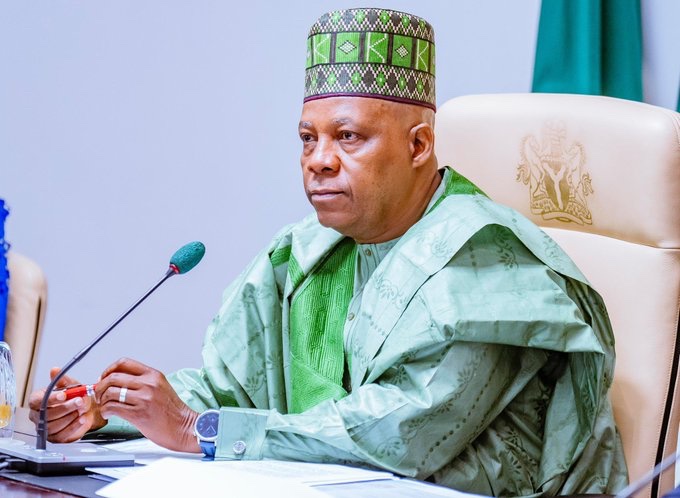National
Mismanagement and Corruption, Not Federalism, Are the Real Threats to Nigeria’s Progress — Vice President Shettima

Vice President Kashim Shettima has stated that the primary obstacles hindering Nigeria’s development are not rooted in the structure of federalism, but rather in the persistent issues of mismanagement and corruption. Shettima made this remark while addressing participants at a public policy forum held in Abuja on Tuesday, April 9, 2024.
In his speech, the Vice President emphasized that debates surrounding the restructuring of Nigeria’s federal system, while important, should not overshadow the more urgent problems plaguing governance and service delivery across all levels of government. He pointed out that inefficiency, poor leadership practices, and widespread corruption are the actual impediments to national growth and unity.
“The real threats to our collective progress are not federalism or its structure. It is the culture of mismanagement and corruption that continues to sabotage our potential,” Shettima said.
He noted that many of the grievances often attributed to the design of Nigeria’s federal structure are, in fact, the result of failures in governance and lack of accountability. According to Shettima, even within existing constitutional frameworks, significant development could be achieved if resources were properly managed and institutions strengthened.
The Vice President further warned that blaming federalism for underdevelopment risks diverting attention from the more pressing need to reform public institutions and instill a culture of transparency and discipline. He called on public officials, civil servants, and political leaders to focus on tackling corruption and embracing merit-based leadership.
“Until we begin to prioritize competence and integrity over ethnic or political considerations, we will keep recycling the same problems regardless of the system we operate under,” Shettima said.
He also stressed the need for improved synergy between the federal and state governments, noting that sustainable progress requires effective collaboration, not just decentralization. Shettima argued that even in a restructured Nigeria, failure to address core governance issues would leave the country vulnerable to the same setbacks it currently faces.
The Vice President’s comments come amid renewed calls for restructuring from several political and civil society groups who argue that the current federal arrangement concentrates too much power at the center, thereby stifling local development and marginalizing some regions.
While acknowledging the legitimacy of those concerns, Shettima urged advocates of restructuring to also push for internal reforms within states and local government systems. He noted that some of the worst cases of corruption and service delivery failure occur at sub-national levels, where accountability mechanisms are often weak or non-existent.
Shettima’s remarks are part of a broader message by the current administration, which has consistently emphasized anti-corruption and good governance as central to its policy agenda. President Bola Tinubu’s government has made several public commitments to reform institutions, reduce waste, and hold public officials accountable.
Despite these commitments, critics continue to question the effectiveness of anti-corruption efforts and argue that reforms have not gone far enough. Several high-profile corruption cases remain unresolved, and concerns about transparency in public procurement and project implementation persist.
Nonetheless, Vice President Shettima maintained that progress is possible if Nigerians shift their focus from structural blame to concrete governance reforms. He called on citizens to hold all levels of government accountable and demand better leadership, regardless of political affiliation or regional interest.
In closing, Shettima reiterated that Nigeria’s strength lies in its diversity, and that good governance, not structural overhaul alone, is the key to national prosperity. “We must stop using federalism as a scapegoat for our failures. The real battle is against corruption, mismanagement, and the culture of impunity,” he said.
